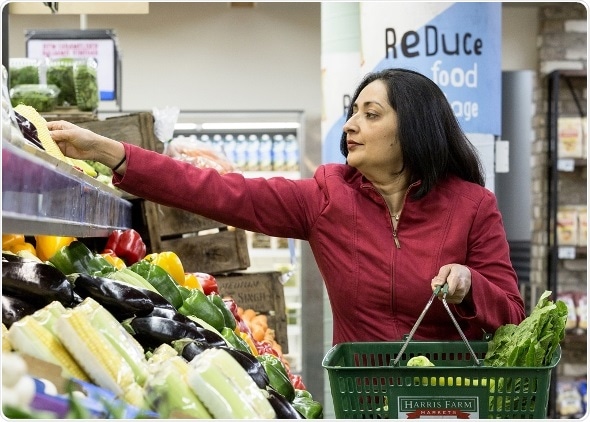Oct 24 2016
Most Australians do not meet World Health Organisation standards for vegetable consumption and now research points to a lack of understanding about the nutritional benefits of the humble vegetable, with health benefit labelling potentially providing the answer.

PhD candidate Reetica Rekhy. Credit: University of Sydney
Although there are some notable exceptions – people tend to be aware of some nutritional benefits of carrots (vision) and spinach (iron/energy) – using the carrot rather than the stick might help more people meet the guidelines of approximately five serves a day, according to research by University of Sydney PhD candidate Reetica Rekhy.
The findings were published recently in Nutrition & Dietetics, by lead author Ms Rekhy under supervision from Professor Robyn McConchie, who is a co-author of the paper.
The research could not come at a better time, as tips about how people can incorporate more vegetables into their diet are being promoted as part of National Nutrition Week (16 - 22 October 2016).
Ms Rekhy, from the School of Life and Environmental Sciences, said although almost one in two Australians eat the recommended two serves of fruit daily, her survey of 1000 adults found only 6% of adults consumed the recommended serves of vegetables.
“Just knowing you should eat your vegies has not proven sufficient; consumption even in developed countries falls short of the daily intake recommended by the World Health Organisation,” she said.
“It’s possible that with labelling the health benefits of specific vegetables on retail packs, point of sale advertising and other marketing collateral, this could change.”
Although it was generally known that it was important to eat vegetables for health reasons, Ms Rekhy said survey respondents did not have a good understanding about specific nutritional benefits of most vegetables.
Ms Rekhy, an agri-food professional who has just submitted her PhD thesis after 20 years in the industry, said the basis for her thesis was the fact that appropriate vegetable consumption was crucial to reduce the risk of diseases such as cardiovascular conditions, cancers and obesity,.
“Some of the most challenging consumers are children – my own experience is, it helps to hide it in the food, but also get your kids to understand that they’re eating delicious vegetables,” said Ms Rekhy, who has a five-year-old.
As part of her work, Ms Rekhy has reviewed the Veggycation website, which includes palatable information for children and adults.
The Australian Guide to Healthy Eating recommends people eat two to eight serves of vegetables and legumes each day, based on age, physical activity levels and body size. One serve is described as about one cup of uncooked or half a cup of cooked or canned vegetables/beans. Potatoes and other starchy tubers are not considered vegetables for the purposes of the requirements but tomatoes, although officially a fruit, are included in the vegetable count.
What’s in a vegetable? Did you know:
- Carrots: Healthy vision; heart; bones & joints; brain & nervous system; immune system; skin.
- Broccoli: Healthy bones & joints; brain & nervous system; heart; and immune system.
- Asparagus: Healthy bones & joints; brain & nervous system; heart; hydrate your body; immune system.